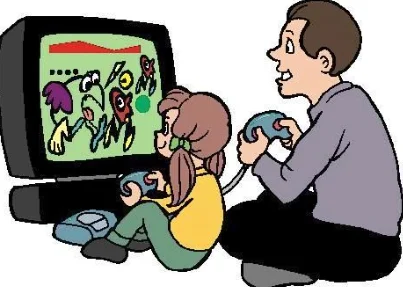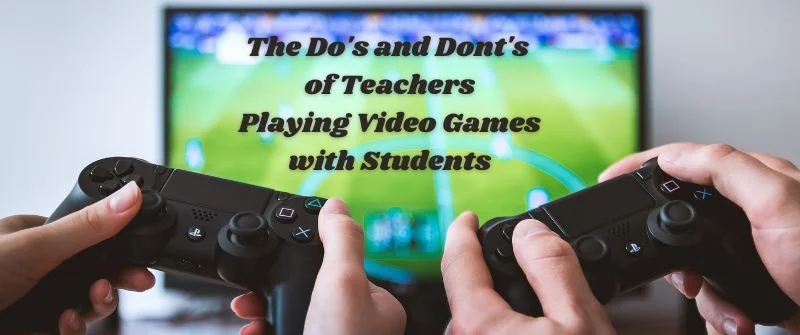Video games are interactive electronic games that offer diverse genres, from action and adventure to simulation and strategy, captivating players worldwide.
Video games have cultural significance and social impact and can be utilized for educational and recreational purposes. In this write-up, we want to discover if it is right for the teacher to play video games with the students or not.
Let’s get started.
Teacher Playing Video Games

It can be an excellent technique for teachers to interact with their pupils and interest them if they play video games with their classes. It has the potential to create a positive learning atmosphere and to build rapport when done appropriately.
Choosing educational games that align with the learning goals, imposing time limits, and encouraging teamwork are some of the things that should be done.
Critical thinking, problem-solving, and the ability to work together are all qualities that can be improved through gaming. However, extreme caution is required because some games may be intrusive or inappropriate for the audience.
Educators must retain a professional demeanor, keep open lines of communication with parents, and ensure that educational video games supplement rather than supplant other teaching strategies.
In the end, utilizing gaming as a teaching tool has the potential to make students’ educational experiences more engaging and pertinent.
Instances When a Teacher can Play Video Games with Students
1. Video Game Class
A teacher can play video games with students in a dedicated video game class, where the main focus is exploring and analyzing games for educational purposes. Also, this class can involve studying game design, game mechanics, storytelling, and their impact on society. It allows students to learn and engage in a fun and interactive way.
2. For Entertainment
In order to keep the class entertained during extracurricular activities or special occasions like game nights or semester-end parties, teachers can play video games with the pupils.
Still, this enables students to unwind, enjoy themselves, and establish a good rapport with their teachers. But it’s essential to make sure the games are age-appropriate and to keep a balance with other educational pursuits.
3. When it is an Educational Video
If a video game is made with education in mind, a teacher can play it with the kids. These instructional video games can be used as interactive teaching aids to improve students’ critical thinking abilities, reinforce academic concepts, and make learning fun.
4. To Interact with Students
Teachers can play video games with them to interact and build relationships with students outside of the usual classroom setting. Promoting a casual, laid-back atmosphere can develop open communication and trust between the teacher and students.
Through this contact, the needs of the pupils may be better understood and met.
When Teacher Playing Video Games with Students is Inappropriate

1. The Game is Irrelevant
When a teacher plays video games with students, it becomes inappropriate if the game is irrelevant to the educational context or age-inappropriate for the students.
In such cases, the gaming activity lacks educational value and wastes valuable learning time.
2. Adult-Level Video Games
Due to their mature material, violence, or explicit themes, it is improper for teachers to play adult-rated video games with their students.
Such games are inappropriate for pupils of their age, and exposing them to them might harm their emotional and psychological growth.
3. When it is not Beneficial
Playing video games with students is unacceptable when there is no underlying instructional or developmental aim. An activity may be a lost chance for fruitful participation if it doesn’t have a clear learning purpose or doesn’t help the students’ progress.
Rules Guiding Video Game Playing with Students
When playing video games with students, certain rules and guidelines should be followed to ensure a safe, educational, and enjoyable experience:
- Age-appropriate games: Select games suitable for the students’ age, maturity level, and cultural context to avoid exposing them to inappropriate content.
- Educational value: Prioritize games with clear learning objectives that align with the curriculum or specific educational goals.
- Set time limits: Establish a reasonable time frame for gaming sessions to avoid excessive screen time and ensure a balanced approach to learning.
- Supervision: Provide appropriate supervision during gaming activities to maintain a safe and controlled environment.
- Communication: Engage in open communication with students about the purpose of gaming and its connection to their learning journey.
- Foster teamwork: Encourage cooperative play, teamwork, and positive social interactions among students during gaming sessions.
- Inclusivity: Ensure that all students feel welcome and included, regardless of their gaming skills or preferences.
- Respect boundaries: Be sensitive to individual preferences and comfort levels regarding video game participation.
- Reinforce classroom learning: Integrate gaming experiences with the broader curriculum to reinforce and enrich the educational process.
- Parental consent: Obtain parental consent if necessary, especially when using games outside of regular school hours or for specific projects.
- Avoid favoritism: Treat all students equally and avoid favoritism based on gaming abilities or preferences.
- Maintain professionalism: While gaming can be fun, always remember the teacher-student relationship and maintain a professional demeanor.

Frequently Asked Questions
Yes, video games can benefit teachers as they can serve as effective educational tools, enhance teaching strategies, and facilitate better student engagement and learning experiences.
The permissibility of teachers playing online games with students may vary based on school policies and regulations. It’s essential to consult school administration and consider the educational value and appropriateness of the games before engaging in such activities.
Playing video games on a school day is generally not advisable if it interferes with academic responsibilities or becomes excessive. Moderation is key, and students should prioritize their studies and other obligations before engaging in recreational activities like gaming to maintain a healthy balance.
While some teachers may find it tempting to play Fortnight or other video games with students, it is generally not recommended. Fortnight is known for its violence and competitive nature, making it inappropriate for the teacher-student dynamic. It’s better to stick to educational games or more age-appropriate recreational activities.
